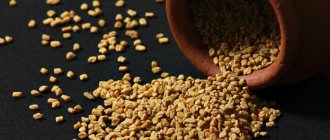What does it consist of?
Rosehip, popularly nicknamed “wild rose,” is a perennial, wild-growing thicket of shrubs belonging to the Rosaceae family. The height of the bushes does not exceed 2.5 meters, the densely growing shoots are covered with thorns. The fruits are conventionally called berries, although according to the botanical classification they are multi-nuts. The degree of ripening is determined by hardness and color - it should be deep red or orange.
The composition of rose hips includes a huge number of vitamins and minerals important for the human body. The fruits are rich:
- Vitamin A, involved in the normal course of metabolic processes. Essential for good vision and healthy skin.
- Tocopherol, which slows down the aging process, accelerates regenerative processes in tissues, and increases muscle tone.
- B vitamins, responsible for the proper functioning of the nervous and cardiovascular systems.
- Phylloquinone, which ensures the absorption of calcium and interaction with other elements.
In addition, the berries contain pectin, minerals (magnesium, calcium, potassium), phytoncides, tannins, and vitamin C, which makes rose hips so effective for colds. Scientists have calculated that the content of ascorbic acid in the fruits of this plant is tens of times higher than that of the recognized champions: lemon and black currant.
All microelements and vitamins in rose hips are in a form that is easily accessible for absorption by the body. The whole complex of useful substances is used for the prevention and treatment of various ailments.
Rose hip decoction recipe
To prepare a decoction of dried rose hips for colds, for general strengthening of the body and for other purposes, do the following:
- Boil a liter of water;
- Add one hundred grams of dried fruits, after extinguishing the fire;
- Wrap the pan in a warm cloth and leave for an hour;
- Mash the berries and leave for another two hours in a warm place, covered;
- Strain the finished broth and cool.
We have provided only one available recipe - a separate review on our website provides detailed descriptions of methods for preparing fresh and dried fruits.
Now you probably know how rosehip decoction is useful for the human body, and in which cases it is simply irreplaceable. We told you how and when to take the drink - study the review, learn new information and use the berries only when necessary, without abuse.
What are the benefits of rose hips for the human body?
The unique properties of rose hips were noticed in ancient times. Modern medicine has officially recognized the positive effects of the plant on health.
All parts of the wild rose have healing properties, but in practice, berries are more often used as the main source of beneficial components.
Rosehip is used to strengthen the immune system, restore strength after illness and improve body tone. The main purpose of the plant is to compensate for vitamin C deficiency in adults and children.
Other medicinal properties of rose hips:
- promotes the production of red blood cells, helps with anemia;
- has a choleretic effect, used for stagnation of bile;
- is a mild diuretic;
- lowers blood pressure;
- helps with atherosclerosis;
- powerful antioxidant;
- tinctures from fruits have a beneficial effect on blood vessels, reducing fragility and permeability;
- Rosehip oil is used externally in the treatment of minor abrasions and cracks; it has bactericidal and wound-healing properties, stimulating the regeneration of the skin and mucous membranes.
How it will help men
Berries can have a powerful tonic effect on the body, which is especially important for representatives of the stronger sex who regularly experience increased mental and physical stress.
Decoctions of wild rose fruits have a mild diuretic effect. This property is recommended for use in the fight against prostate adenoma and other “male” diseases of the reproductive system. Of course, treatment with rose hips without taking medications will not get rid of a serious illness completely, but as part of complex therapy it will help speed up recovery.
Rose hips are especially useful for men with high blood cholesterol levels and a predisposition to the development of atherosclerosis. Regular consumption of berry decoctions and infusions helps cleanse blood vessels of cholesterol plaques, strengthen vascular walls, and generally improve blood microcirculation.
Benefits for women
Having a mild diuretic effect, wild rose fruits help remove excess fluid from the body, thereby reducing swelling.
Rose hips are useful for the heart and blood vessels; products based on the fruit help strengthen capillaries, cleanse blood vessels of plaques and toxins.
Rose hips will be a good helper for women suffering from inflammatory gynecological diseases. The substances contained in wild rose fruits help relieve inflammation and heal damaged mucous membranes.
Berries have a beneficial effect on the nervous system: they help cope with stress, calm, and reduce anxiety, which is especially important for women experiencing menopause.
Use during pregnancy and breastfeeding
During pregnancy, almost all the resources of the female body are spent on ensuring the growth and development of the unborn child. A woman preparing to become a mother is especially susceptible to viral infections at this time. But it is prohibited to use most medications while in the “position”.
But rose hips during pregnancy are allowed and indicated for use as a natural immunomodulator that helps protect against colds and eases the well-being of those who have already “caught” the infection. In addition, berry decoctions and infusions perfectly help cope with the manifestations of toxicosis at any stage of pregnancy.
Rose hips will also bring considerable benefits to women during lactation. A drink made from wild rose fruits will give a nursing mother strength, calm the nervous system, help cope with postpartum depression and strengthen the immune system weakened by pregnancy and childbirth.
True, rose hips are used during breastfeeding only if the baby does not have an allergic reaction to it. It is better to prepare decoctions and infusions from dried fruits, since such berries contain few essential oils, which means they are safest for children.
If the baby does not have allergies, then weakly brewed rosehip tea is given to the child as a means to boost immunity, starting from the age of six months.
How to take for women
Indications for the use of rosehip decoction for women are extremely wide:
- Relieves inflammation, including gynecological problems;
- Limits cholesterol production;
- Helps cope with depression and improves mood;
- Normalizes blood pressure;
- Has a beneficial effect on the functioning of the heart, kidneys and liver, blood vessels;
- Helps normalize metabolism and promote weight loss.
The benefits of rosehip decoction for the human body are undeniable - this is evidenced by the composition rich in microelements. Are there any contraindications for women? You will find the answer at the end of the article, be sure to continue reading.
For pregnant
Let's figure out how rosehip decoction is useful for the body of a woman who is expecting a baby. During this period, the use of medications is not recommended - but folk remedies can produce a healing effect.
Let's study the benefits and contraindications of rosehip decoction for pregnant women - let's start with the beneficial effects:
Removing excess fluid and relieving swelling;- Reducing nausea, helping with toxicosis;
- Eliminates problems with metabolism, pacifies appetite;
- Regulates hormonal levels;
- Normalizes the state of the endocrine system;
- Helps essential vitamins be absorbed faster;
- Reduces the load on the liver;
- Improves the elasticity of blood vessels;
- Reduces the effect of allergens;
- Increases resistance to external infections.
A large amount of vitamins brings great benefits to the body, but there are also minor contraindications. This is why fluid intake must be agreed upon with a gynecologist!
You should not drink liquid in the following cases:
- Pressure surges;
- Presence of diathesis;
- For kidney diseases;
- With increased stomach acidity.
We talked about the female body - it’s time to figure out how rosehip decoction is useful for men. And then you can read our other article about the benefits of oat decoction.
During lactation
The beneficial properties of rosehip decoction during breastfeeding have been studied quite well - however, we recommend that you consult a doctor so that he can confirm the possibility of oral administration.
The use is not contraindicated, since the period of breastfeeding excludes the use of medications - this is where traditional medicine comes to the rescue. Let's look at the benefits and harms of rosehip decoction.
We also recommend: Onion peel decoction
The drink will be useful for the following reasons:
- Improves lactation;
- Provides the child with protection against colds.
Pay attention to how to take rosehip decoction - use only dried berries to avoid allergic reactions in infants.
There is also some minor harm that berries can cause:
- Diuretic effect;
- May cause colic and discomfort in the gastrointestinal tract.
Now that we know how to use the drink during breastfeeding, let's move on to other cases.
Contraindications and harm
In some cases, the use of rose hips is not recommended:
- Due to the increased content of ascorbic acid, problems may arise in people with gastric diseases (ulcers, gastritis with high acidity).
- It is necessary to remember the rule: hypertensive patients should not take tinctures with alcohol, and water tinctures are not recommended for hypotensive patients.
- It is dangerous to take rose hips in case of heart failure, and it is strictly forbidden if you are prone to blood clots and thrombophlebitis.
- Remedies prepared from rosehip roots slow down the secretion of bile and increase the problem of constipation.
- If you have dermatological diseases, you should be careful and consult your doctor.
Acid negatively affects tooth enamel if you do not rinse your mouth immediately after taking the infusion.
Long-term use of rose hips and plant-based preparations provokes the leaching of calcium from the body. We must not forget about this so as not to harm our own health.
In addition, the fruits of wild roses, in order to cleanse the kidneys of sand and stones, are consumed only on their own, without simultaneously resorting to taking medications.
Harm from rose hips can result in the development of allergic reactions to certain substances contained in the berries.
Individual intolerance manifests itself in the form of side symptoms:
- nausea;
- vomit;
- digestive disorders;
- rash.
If there is a “hint” of an allergy, stop taking products based on wild rose fruits immediately.
Use for diseases
Pancreatitis
Rose hips for pancreatitis and other disorders of the pancreas are taken as an addition to the main course of treatment prescribed by the doctor. Regular consumption of berries contributes to:
- accelerated healing of damaged tissues of the digestive system;
- reduction of pain;
- normalization of metabolic processes.
This significantly alleviates the patient's condition.
Gastritis
Wild rose fruits contain large amounts of organic acids. Therefore, rose hips are used for gastritis only if the disease is accompanied by reduced or normal gastric secretion.
In this case, taking berries helps improve digestion, eliminate inflammation and heal damaged mucous membranes. However, with increased acidity, consuming rose hips is contraindicated, since the plant only aggravates the course of the disease.
Diabetes
Due to its high content of nutrients, rose hips help restore reserves of vitamins and microelements in a weakened body in diabetes mellitus. The fruits do not have a direct effect on the disease, but regular use of decoctions and infusions from the plant gives a person the strength to fight a serious illness.
Cardiovascular diseases
The effect of rose hips on the cardiovascular system is ambiguous. On the one hand, regular consumption of berries strengthens the walls of blood vessels and has a beneficial effect on hematopoietic processes. On the other hand, rosehip increases or decreases blood pressure depending on the form in which it is used.
In order not to provoke a deterioration in the condition of problems with blood pressure, you should correctly select the dosage form of products based on wild rose fruits (decoctions, teas, alcohol infusions). It is worth consulting with your doctor about how to drink rose hips in each specific case.
Kidney diseases
The healing properties of rose hips for kidney problems are well known. The fruits are often used as a diuretic. They are taken to stop inflammatory processes in the kidneys and relieve symptoms of urolithiasis. Not only berries are used to treat problems with the genitourinary system. Traditional medicine recommends using rosehip root for kidney stones.
Plant composition
The exact composition depends on the specific type of berries and their territorial growth. Rose hips in general are rich in vitamin C. The plant contains several times more of it than apples or currants. The berries are saturated with carotene, organic acids, B vitamins. Contains rose hips and minerals, for example, manganese, iron, phosphates.
The plant is rich in beneficial fatty acids and essential oils, which have a positive effect on the human body. In addition, rose hips are low in calories (110 kcal/100g), which allows them to be consumed during periods of intense weight loss.
How to brew rose hips correctly
A description of rosehip and useful recipes from it can be found in the records of Hippocrates. Even then, ancient doctors knew how tangible benefits this berry brings to humans. Drinks are prepared from the fruit to improve health.
General strengthening decoction
Rose hips for immunity and increased vitality are brewed as follows:
- 100 gr. crushed fruits are poured with a liter of water.
- Boil for 10 minutes, covered, over low heat.
- Let it brew for 3 hours.
- Take on its own after meals or add to regular tea.
To improve health, prepare a rosehip decoction in a thermos, adding equal amounts of dried apricots and prunes. Leave for 8 hours, take 3-4 times a day after meals.
Infusion for colds
To cure acute respiratory infections or flu, prepare an infusion:
- 3 tbsp. spoons of fruit are poured with 2 glasses of water. Before brewing rose hips, rinse the berries in running water.
- Bring to a boil over low heat.
- After waiting a couple of minutes, turn off the stove.
- Cool.
- Strain.
The infusion is drunk 3-4 times a day until the symptoms of the disease disappear. To enhance the effect, add dried linden or chamomile flowers. Rose hips are used in the same form for children, but consult your doctor about treatment methods.
Remedy for prostatitis
To treat “male” diseases, rose hips and hawthorn are used together, from which a decoction is prepared:
- Add 1 tbsp to a glass of rose hips. a spoonful of hawthorn berries.
- Pour the mixture with 1.5 liters of boiling water.
- Place in a water bath for 1.5-2 hours.
- Cool.
- Strain.
Take the product once a day for 2 weeks.
Decoction against liver diseases
Rosehip for the liver is used as a cleanser and an auxiliary component of treatment. An infusion is prepared from the fruits:
- 70 gr. crushed berries are poured with 1.5 glasses of water.
- Place on low heat.
- Boil for 2 hours.
Use 4-5 times a day, dosage – 100 ml. for 1 appointment.
Rosehip for beauty and slimness
The beneficial properties of rosehip have also been used in cosmetology. Fruit extract is added to face, body and hair care products. Creams and masks based on berries nourish, moisturize, smooth the skin, giving a fresh, blooming appearance.
Rose hips will be of great benefit to the face in adulthood. The vitamins and antioxidants contained in the berries promote skin renewal, increase protective properties, and normalize metabolic processes at the cellular level.
The rich composition of rose hips is used in hair care. Masks, decoctions, and infusions for rinsing are prepared from the berries. Wild rose seed oil is used for medicinal purposes.
Rosehip has proven itself especially well for hair that needs deep restoration - brittle, lifeless, prone to loss. Cosmetics prepared from berries help restore hair to a healthy, well-groomed appearance, effectively get rid of dandruff, and awaken dormant hair follicles.










